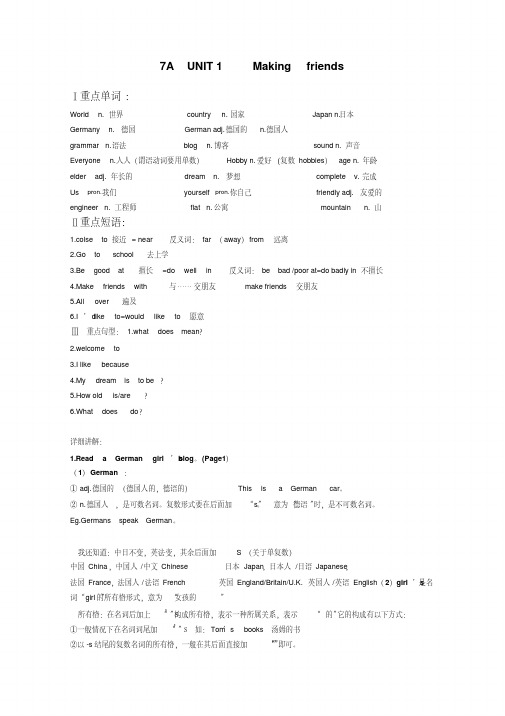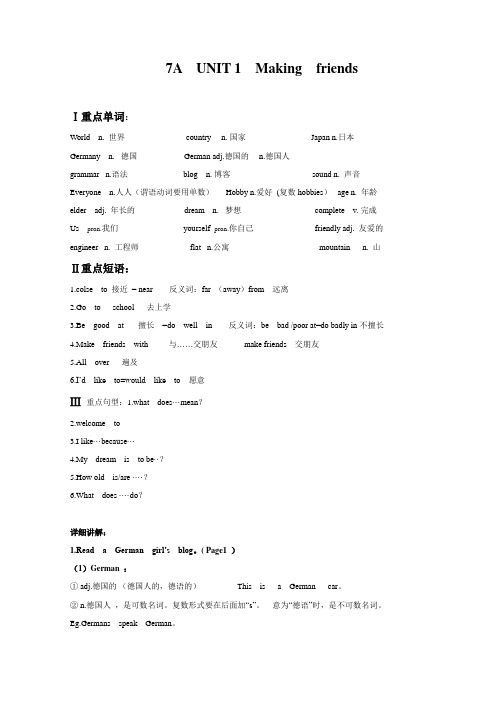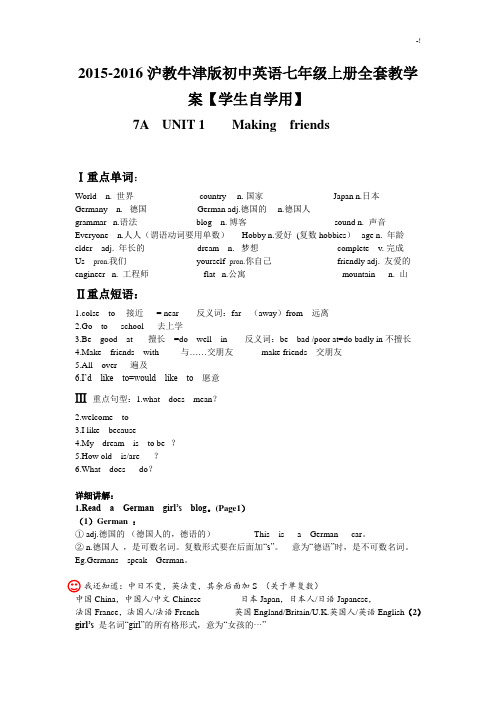2016-2017沪教牛津版初中英语七年级上册全套教学案【学生自学用】
【最新】沪牛津版初中英语七年级上册全套教学案【学生自学用】

7A UNIT 1 Making friendsⅠ重点单词:World n. 世界country n. 国家Japan n.日本Germany n. 德国German adj.德国的n.德国人grammar n.语法blog n. 博客sound n. 声音Everyone n.人人(谓语动词要用单数)Hobby n.爱好(复数hobbies)age n. 年龄elder adj. 年长的dream n. 梦想complete v. 完成Us pron.我们yourself pron.你自己friendly adj. 友爱的engineer n. 工程师flat n.公寓mountain n. 山Ⅱ重点短语:1.colse to 接近 = near 反义词:far (away)from 远离2.Go to school 去上学3.Be good at 擅长 =do well in 反义词:be bad /poor at=do badly in不擅长4.Make friends with 与……交朋友 make friends 交朋友5.All over 遍及6.I’d like to=would like to 愿意Ⅲ重点句型: 1.what does···mean?2.welcome to·3.I like···because··?4.My dream is to be····?5.How old is/are ····do?6.What does ·详细讲解:1.Read a German girl’s blog。
(Page1)(1)German :① adj.德国的(德国人的,德语的)This is a German car。
(完整版)沪教牛津版初中英语七年级上册全套教学案

7A UNIT 1 Making friendsⅠ重点单词:world n. 世界country n. 国家Japan n.日本Germany n. 德国German adj.德国的n.德国人grammar n.语法 blog n. 博客sound n. 声音everyone n.人人(谓语动词要用单数)hobby n.爱好(复数hobbies)age n. 年龄elder adj. 年长的dream n. 梦想complete v. 完成us pron.我们 yourself pron.你自己friendly adj. 友爱的engineer n. 工程师 flat n.公寓mountain n. 山Ⅱ重点短语:1.colse to 接近 = near 反义词:far (away)from 远离2.go to school 去上学3.be good at 擅长 =do well in 反义词:be bad /poor at=do badly in不擅长4.make friends with 与……交朋友 make friends 交朋友5.all over 遍及6.I’d like to=I would like to 愿意Ⅲ重点句型:1.what does···mean?2.welcome to3.I like···because···4.My dream is to be··.5.How old is/are ····?6.What does ····do?Ⅴ详细讲解:1.Read a G erman girl’s blog.(Page1)(1)German :① adj.德国的(德国人的,德语的)This is a German car.② n.德国人,是可数名词。
沪教牛津版初中英语七年级上册全套教学教案

7A UNIT 1 Making friendsⅠ重点单词:World n. 世界country n. 国家Japan n.日本Germany n. 德国German adj.德国的n.德国人grammar n.语法blog n. 博客sound n. 声音Everyone n.人人(谓语动词要用单数)Hobby n.爱好(复数hobbies)age n. 年龄elder adj. 年长的dream n. 梦想complete v. 完成Us pron.我们yourself pron.你自己friendly adj. 友爱的engineer n. 工程师flat n.公寓mountain n. 山Ⅱ重点短语:1.colse to 接近 = near 反义词:far (away)from 远离2.Go to school 去上学3.Be good at 擅长 =do well in 反义词:be bad /poor at=do badly in不擅长4.Make friends with 与……交朋友 make friends 交朋友5.All over 遍及6.I’d like to=would like to 愿意Ⅲ重点句型:1.what does···mean?2.welcome to3.I like···because···4.My dream is to be··?5.How old is/are ····?6.What does ····do?详细讲解:1.Read a German girl’s blog。
( Page1 )(1)German :① adj.德国的(德国人的,德语的)This is a German car。
2015-2016年度沪教牛津版初级中学英语七年级上册全部资料教学方案计划案【学生自学用】

2015-2016沪教牛津版初中英语七年级上册全套教学案【学生自学用】7A UNIT 1 Making friendsⅠ重点单词:World n. 世界country n. 国家Japan n.日本Germany n. 德国German adj.德国的n.德国人grammar n.语法blog n. 博客sound n. 声音Everyone n.人人(谓语动词要用单数)Hobby n.爱好(复数hobbies)age n. 年龄elder adj. 年长的dream n. 梦想complete v. 完成Us pron.我们yourself pron.你自己friendly adj. 友爱的engineer n. 工程师flat n.公寓mountain n. 山Ⅱ重点短语:1.colse to 接近 = near 反义词:far (away)from 远离2.Go to school 去上学3.Be good at 擅长 =do well in 反义词:be bad /poor at=do badly in不擅长4.Make friends with 与……交朋友 make friends 交朋友5.All over 遍及6.I’d like to=would like to 愿意Ⅲ重点句型:1.what does···mean?2.welcome to3.I like···because···4.My dream is to be··?5.How old is/are ····?6.What does ····do?详细讲解:1.Read a German girl’s blog。
(Page1)(1)German :① adj.德国的(德国人的,德语的)This is a German car。
沪教版七年级英语第一学期试用本全套教案

Unit 1 Relatives in Beijing【教学目标】1.本单元在语法要求上的一个重点是时态,现在完成时、一般将来时、一般过去时的各自特点、用法、构成,以及彼此之间的联系都是要求学生认真学习的。
2.本单元的语言背景是有关外出旅游的,因此,课文中出现的许多表达都很有实用价值,要求学生能够较好的掌握这些表达,具备相应的speaking ability。
3.要求学生掌握出现在本单元中的一些相关句型以及它们之间的关联。
4.因为本单元涉及到旅游,所以,在表达地点(尤其是北京)时要注意地点名称以及对应的介词的正确使用。
5.本单元的最后还提供给了学生写“游后感”的书面范例,使学生在“能说会道”的基础上加强了写作的能力,这是一个能力的提升。
(写作中,混合了综合的时态,属于较高的要求。
)【教学重难点】1.关键词:1)形容词比较级:cheaper, more interesting…等2)地点名称及介词搭配:in the Summer Palace, in the Forbidden City, on the Great wall, at Tiananmen Square.2.功能:1)提建议:对于本单元中出现的Why don’t we…?提建议的方式,可以结合以前教过的其他方式进行教学,帮助学生归类。
2)表达个人倾向:would like to do…/want to do …/结合would like sth./want sth.。
3)本单元中出现的关于时间的句型:It takes sb. some time to do sth. 及其特殊疑问句的表达,是一个较为常用的句型知识点,要求学生必须掌握好。
4)本单元中出现了以How开头的不同特殊疑问句,注意各自功能特点,如;How much…? (问价格)/How long…? (问时间长度)/How are we going there? (问方式)。
2015_2017年沪教牛津版初中英语七年级(上册)全套教学案[学生自学用]
![2015_2017年沪教牛津版初中英语七年级(上册)全套教学案[学生自学用]](https://img.taocdn.com/s3/m/93dbd00a5727a5e9856a61c8.png)
2015-2016沪教牛津版初中英语七年级上册全套教学案【学生自学用】7A UNIT 1 Making friendsⅠ重点单词:World n. 世界 country n. 国家 Japan n.日本Germany n. 德国 German adj.德国的 n.德国人grammar n.语法 blog n. 博客 sound n. 声音Everyone n.人人(谓语动词要用单数) Hobby n.爱好 (复数hobbies) age n. 年龄elder adj. 年长的dream n. 梦想 complete v. 完成Us pron.我们 yourself pron.你自己 friendly adj. 友爱的engineer n. 工程师flat n.公寓 mountain n. 山Ⅱ重点短语:1.colse to 接近 = near 反义词:far (away)from 远离2.Go to school 去上学3.Be good at 擅长 =do well in 反义词:be bad /poor at=do badly in 不擅长4.Make friends with 与……交朋友 make friends 交朋友5.All over 遍及6.I’d like to=would like to 愿意Ⅲ 重点句型:1.what does···mean?2.welcome to3.I like···because···4.My dream is to be··?5.How old is/are ····?6.Wh at does ····do?详细讲解:1.Read a German girl’s blog。
沪教牛津版初中英语七年级上册全套教学案

7A UNIT 1 Making friendsⅠ重点单词:World n. 世界country n.国家Japan n.日本Germany n.德国German adj.德国的n.德国人grammar n.语法blog n.博客sound n. 声音Everyone n.人人(谓语动词要用单数)Hobby n.爱好(复数hobbies)age n. 年龄elder adj. 年长的dream n.梦想complete v.完成Us pron.我们yourself pron.你自己friendly adj. 友爱的engineer n.工程师flat n.公寓mountain n. 山Ⅰ重点短语:1.colse to 接近= near 反义词:far (away)from 远离2.Go to school 去上学3.Be good at 擅长=do well in 反义词:be bad /poor at=do badly in不擅长4.Make friends with 与……交朋友make friends 交朋友5.All over遍及6.I’d like to=would like to 愿意Ⅰ 重点句型:1.what does···mean?2.welcome to3.I like···because···4.My dream is to be··?5.How old is/are ····?6.What does ····do?详细讲解:1.Read a German girl’s blog。
(Page1)(1)German :① adj.德国的(德国人的,德语的)This is a German car。
沪教版七年级英语上册全册教案

Module 1 My lifeUnit 1 Making friends本课是教材Module 1 Unit 1的教学设计。
本单元的语言功能项目是To revise vocabulary and expressions to describe people.主要话题是To generate ideas about people’s appearance and personalities,本课内容贴近学生的生活和学习实际,为学生操练对话创设了一个真实的语言情景,有利于学生在比较接近实际的情景中听听说说,从而培养他们运用英语进行交际的能力。
【知识目标】1. To revise vocabulary and expressions to describe people2. To guess meaning from context3. To categorize adjectives to describe important qualities of a friend according to personal preferences.【能力目标】To use the sentences in context.【情感目标】利用多种游戏或活动形式培养学生对英语学习的浓厚兴趣。
【教学重点】To generate ideas about people’s appearance and personalities.【教学难点】通过阅读活动,引导学生通过阅读抓住关键信息,了解故事大意,通过角色扮演,让学生巩固和运用本单元所学核心词汇和句型。
Tape recorder, Multimedia.Step 1. Lead-in1. Free talkT: I’m very happy to be here and teach you English. First, let me introduce myself.2. Ask three questions:(1) Can everyone be your friend?(2) How many friends do you have in our class?(3) When you choose a friend, how do you want he is like?Step 2. Listen and read1. Play the tape for students to listen and answerQ: (1) What food does Eddie give Hobo? (a cake, some milk)(2) What does Hobo want at last? (the pizza in Eddie’s bowl).2. Read after tape while thinking about the following questions:(1) If you are Eddie, will you give the pizza to Hobo?(2) What will you do?3. Act the dialogue out.Step 3. PresentationT: Do you like Eddie or Hobo? Why? How is your friend like?Students discuss in groups of 4 and then report.Step 4. Choose and read1. T: Let’s look at some qualities of good friend. Please match the words with the questions.2. Check the answer and read the questions and words together.Step 5. Brain-storming1. T: Do you have any other ideas of a good friend? Can you use some words to describe your best friend?2. Discuss in pairs and write down the word.3. 2—3 students to report.Step 6. Tick and answerT: Which qualities do you think are very important while others are not so important? Please tick them. Then report it to class.It is (very/quite/not) important for my friend to be+ adj.Step 7. SummarizeT: Today we have learned some important qualities about a good friend. It seem that we all think appearance is not so important, but he should be helpful and honest. And I hope everyone can be like that and you will have more friends.略。
- 1、下载文档前请自行甄别文档内容的完整性,平台不提供额外的编辑、内容补充、找答案等附加服务。
- 2、"仅部分预览"的文档,不可在线预览部分如存在完整性等问题,可反馈申请退款(可完整预览的文档不适用该条件!)。
- 3、如文档侵犯您的权益,请联系客服反馈,我们会尽快为您处理(人工客服工作时间:9:00-18:30)。
7A UNIT 1 Making friendsⅠ重点单词:World n. 世界country n. 国家Japan n.日本Germany n. 德国German adj.德国的n.德国人grammar n.语法blog n. 博客sound n. 声音Everyone n.人人(谓语动词要用单数)Hobby n.爱好(复数hobbies)age n. 年龄elder adj. 年长的dream n. 梦想complete v. 完成Us pron.我们yourself pron.你自己friendly adj. 友爱的engineer n. 工程师flat n.公寓mountain n. 山Ⅱ重点短语:1.colse to 接近 = near 反义词:far (away)from 远离2.Go to school 去上学3.Be good at 擅长 =do well in 反义词:be bad /poor at=do badly in不擅长4.Make friends with 与……交朋友 make friends 交朋友5.All over 遍及6.I’d like to=would like to 愿意Ⅲ重点句型:1.what does···mean?2.welcome to3.I like···because···4.My dream is to be··?5.How old is/are ····?6.What does ····do?详细讲解:1.Read a German girl’s blog。
(Page1)(1)German :① adj.德国的(德国人的,德语的)This is a German car。
② n.德国人,是可数名词。
复数形式要在后面加“s”。
意为“德语”时,是不可数名词。
Eg.Germans speak German。
我还知道:中日不变,英法变,其余后面加S (关于单复数)中国China,中国人/中文Chinese 日本Japan,日本人/日语Japanese,法国France,法国人/法语French 英国England/Britain/U.K.英国人/英语English(2)girl’s 是名词“girl”的所有格形式,意为“女孩的···”所有格:在名词后加上“’s”构成所有格,表示一种所属关系,表示“···的”它的构成有以下方式:①一般情况下在名词词尾加“’s” 如:Tom’s books 汤姆的书②以-s结尾的复数名词的所有格,一般在其后面直接加“’”即可。
如:parents’ names 父母的名字(page2);Teachers’ Day 教师节③表示两人或多人各自的所属关系,要在各个词尾分别加“’s”;表示两人或多人共同的所属关系,只需要在最后一个词的词尾加“’s”。
如:Lily’s and Linda’s bikes。
丽丽和琳达的自行车.(注意:两人各有一辆车)Lily and Linda’s room。
丽丽和琳达的房间。
(注意:两人共住一间房)④表示某人的家、店铺、办公室时,常省略“’s”后面的名词house,shop,office等。
At my uncle’s = at my uncle’s home 在我叔叔家2.I’m from Germany. =I’m from Germany.(page3)come from =be from 来自3.I have an elder sister and an elder brother.(page3)Elder :形容词,“年长的”。
与“younger”相对。
主要用于表示家庭成员之间的长幼关系。
不能用于“than”前面。
elder brother 哥哥younger brother 弟弟elder sister 姐姐younger sister 妹妹Older:泛指新旧、老幼或年龄大小的关系。
可以用于“than”前面。
My elder brother is one year older than I. 我哥哥比我大一岁。
4.Every day,I go to school by school bus.(page3)①go to school是一个固定搭配,不要在“ school”前加“the”。
因为它并不指具体的某所学校。
所在在前面不要加任何冠词。
Go to bed 睡觉;go to hospital去医院;at home 在家注意:play basketball/football(球类),不用加“the”。
Play the piano/violin(乐器),要加“the”。
②by school bus “乘坐校车”:by +交通工具乘坐····By bike 骑自行车by taxi 坐出租车by car 乘小汽车5.I like my school because the teachers are all very friendly.(page3)①because “因为”,引导原因状语从句,语气很强烈。
可以用来回答“why”引导的特殊疑问句。
②friendly 形容词,友好的。
(注意:虽然以-ly结尾,但不是副词,而是形容词)类似的词有:lovely(可爱的)lonely(孤独的)lively (生动的)daily(每日的)ugly(丑的)silly (傻的)6.My dream is to be an engineer .我的梦想是成为一名工程师。
(page3)①一般来说,is后面都不加“to”,但这里“to be an engineer”做表语。
这样结构的例子有:my job/work/task is to feed animals.② dream: n.梦想可数名词。
V.做梦dream of /about (doing) sth.7.I like many sports.many :许多。
修饰可数名词复数。
Many people 许多人Much:许多。
修饰不可数名词much water/time 许多水/手机a lot of既可以修饰可数名词又可以修饰不可数名词。
8.About yourself.Yourself是反身代词,“你自己”。
第一人称:单数myself——复数ourselves第二人称:单数yourself——复数yourselves第三人称:单数himself/herself/itself——复数:themselves9.What does your father/mother do?你父亲/母亲是做什么工作的?What does/do +某人+do?询问某人现在从事何种职业或做什么工作。
其他句型还有:①what +be+某人?(一般不用于第二人称)如:what’s your brother ?——he’s a waiter.②what is sb’s job?如:what’s your father job?——he is a worker.③what do/does +某人+want to be?如:what do you want to be?——I want to be a teacher.10.I’d like to be your e-friend.我想成为你的网友。
(page11)I’d like =I would like 想要用法:①would like +名词如:I’d like an appl e.②would like +to do sth注意:①would like 没有人称和数的变化。
②would like 构成的一般疑问句中,表示“一些”和“某物”时,要用“some”和“something”,而不用“any”和“anything”。
③由“would like ”引导的疑问句的回答方式。
Would you like some bread.——Yes,please./No,thanks.Would you like to join us.——Yes,I’d love /like to.或者,but···(委婉)11.best wishes 最美好的祝愿。
(注意wish要加es)Ⅴ语法:一、特殊疑问句:以疑问代词what, who, whom, whose, which或疑问副词when, where, why, how 等放在句首提问的句子,叫特殊疑问句。
答句必须针对问句中的疑问词来回答。
(一)各种疑问词的用法:1.what用于对句子的主语、宾语、表语提问。
用于提问“事情、东西”,还可以提问“姓名、职业、时间”等。
如:what’s your name?2.Who, whom, whose只能指人,who“谁”,常作主语,whom“谁”,常作宾语,whose“谁的”,常作定语或表语。
Who taught you English last year? 去年哪个老师教你们英语?Whose father works in Beijing? 谁的爸爸在北京工作?3.which用来询问人或物,一般有特定的选择范围。
Which is your sister of the two girls?那两个女孩中,哪个是你姐姐?(限定在这两个女孩中)4.when, where, why, how分别对时间、地点、原因和方式When did you arrive here? 你什么时候到这里的? (对时间)Where were you last night? 你昨晚在哪里?(对地点)Why were you late again? 你怎么又迟到了?(对原因)How do you go to school? 你怎样上学的?——by school bus(对方式)注意:①when与what time的区别:when指的是大体的时间,而what time询问的是具体的时间。
--What time shall we meet? -- At ten o’clock.--When shall we meet? --Tomorrow.②how many用于询问“多少”,且后面接可数名词复数。
——提问数量how much用于提问“多少”,后面接不可数名词,也可对“钱”提问。
——提问不可数名词的数量和价格。
③ how old用于提问年龄“多大岁数”;对应名词“age”how long用于提问时间或长度“多长时间,长度多长”,回答用“for+一段时间”;对应“leight”。
